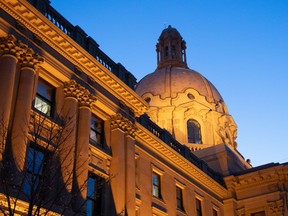[ad_1]
Breadcrumb Path Hyperlinks
Columnists

Article content material
British Columbia and Alberta have some issues in widespread. Each are unusually depending on pure resource-based industries to drive their economies and provide the exports which are very important to sustaining prosperity. Each have been experiencing strong inhabitants development over the previous few years.
And neither has been well-served by a distant nationwide authorities in Ottawa centered extra on preserving pure sources within the floor than on harnessing them in an environmentally sustainable means for the advantage of all Canadians.
Commercial 2
Article content material
Article content material
Lately, B.C. Premier David Eby and Alberta Premier Danielle Smith launched their budgets for the approaching 12 months, and it’s right here the place the similarities diverge and the schism within the two premiers’ financial imaginative and prescient turns into clear.
Alberta’s up to date fiscal plan goals to remain within the black, with small working surpluses anticipated over the forecast horizon. B.C. is taking a distinct path — unprecedented annual deficits because the NDP authorities ramps up spending prematurely of the autumn 2024 election and offers free rein to its ideological inclinations to develop the scale and attain of presidency.
The Fraser Institute just lately reported that within the three years from the onset of the COVID-19 pandemic in 2020 to Q2 of final 12 months, 94 per cent of internet new payroll jobs created in B.C. have been within the public sector. This lopsided labour market is one signal of B.C.’s deteriorating enterprise local weather.
B.C. is planning to incur a mixed working deficit of $28 billion from 2023-24 via 2026/27, a marked departure from the surpluses posted over many of the previous dozen years. For its half, Alberta is banking on continued funds surpluses, albeit considerably smaller than the $5.2 billion projected for the present fiscal 12 months (2023-24).
Article content material
Commercial 3
Article content material
It’s value noting that Alberta’s surpluses are set to shrink past 2023-24 partly due to assumed softer international oil markets — the province garners as much as one-quarter of its revenues from vitality royalties. Ought to oil costs commerce increased than the federal government’s forecast, the small surpluses pencilled into Funds 2024 would improve considerably, additional strengthening Alberta’s monetary place over the medium time period.
Whereas each provinces are dealing with strain in areas reminiscent of heath care and housing prices, owing partly to surging populations, the concept of spending restraint is clearly much less standard in Victoria than Edmonton. The B.C. NDP authorities intends to spice up expenditures by eight per cent in 2024-25. In Alberta, spending development will are available in at roughly half of that determine.
The provinces have each embraced formidable capital spending plans, which contain long-term borrowing outdoors of the confines of the annual working funds. Complete B.C. public sector capital spending will climb to between $18 billion and 19 billion per 12 months over 2024-25 to 2026-27. Alberta’s revised capital plan foresees $25 billion being spent on infrastructure and different public sector capital belongings within the subsequent three years. Public sector capital outlays in B.C. embrace borrowing undertaken by giant Crown companies reminiscent of BC Hydro and ICBC — which don’t exist in Alberta.
Commercial 4
Article content material
Alberta additionally has structural benefits over B.C. and the remainder of the nation within the type of decrease tax charges and decrease debt ranges. Alberta has no provincial gross sales tax and a decrease enterprise earnings tax price (eight per cent versus 12 per cent in B.C.). And Alberta’s public sector debt is roughly 9.3 per cent of GDP and on monitor to lower within the coming years. B.C.’s is at present 17.6 per cent of GDP and anticipated to climb to 27.5 per cent by 2026-27.
Total, the 2 budgets counsel Alberta may be very well-positioned to proceed to guide the nation in financial development, enterprise funding and wage will increase. Albertans already get pleasure from a median GDP per particular person nearly $28,000 increased than in B.C. Alberta ought to proceed to reap the benefits of decrease taxes and more healthy provincial funds.
The extraordinary development in authorities in B.C., mixed with its giant working deficits and fast-rising debt-to-GDP ratio, imply that taxpayers ought to brace themselves for the inevitability of serious tax hikes and lagging funding, and decrease incomes sooner or later.
Chris Gardner is the CEO of the Impartial Contractors and Companies Affiliation, and the president of ICBA British Columbia. Mike Martens is the president of ICBA Alberta.
Article content material
Share this text in your social community
[ad_2]
Source link

